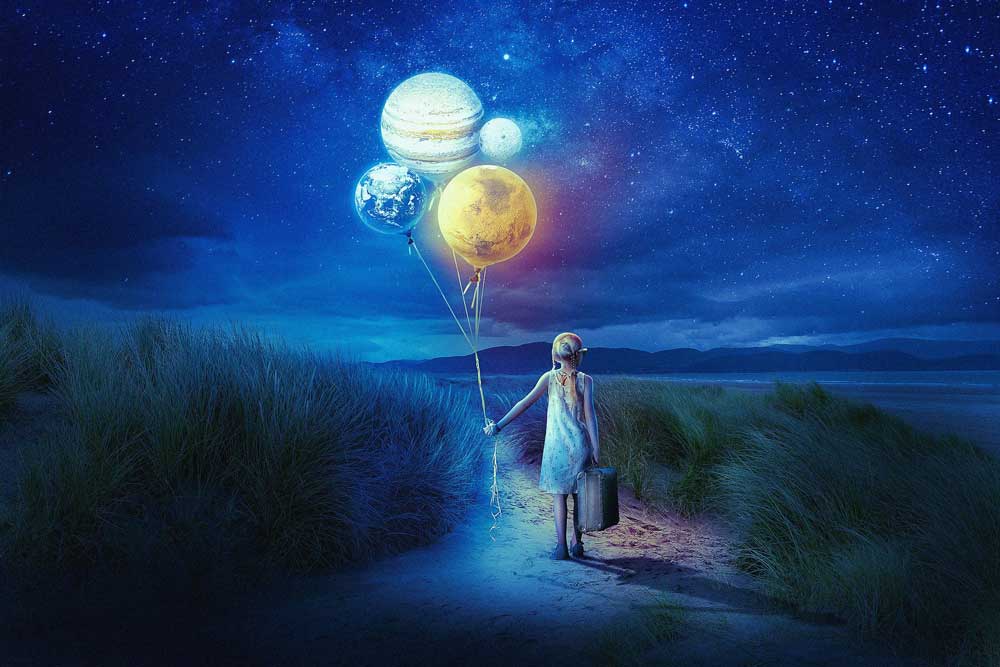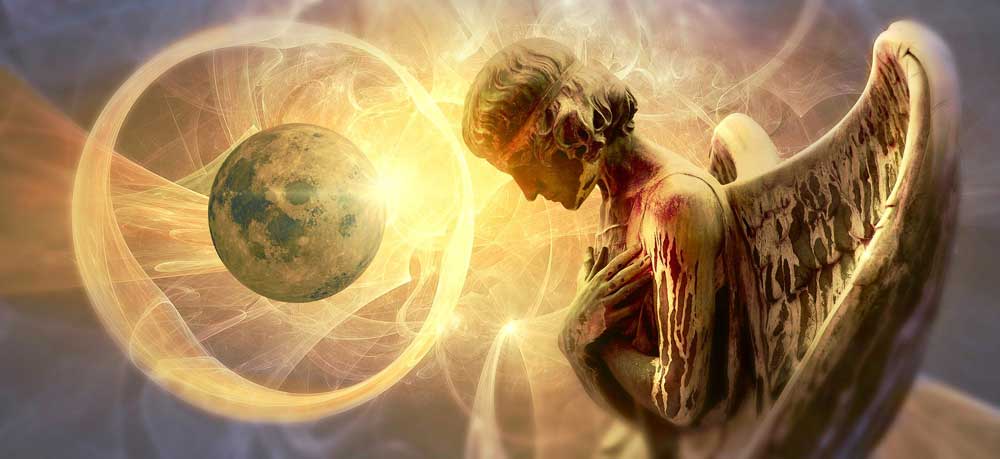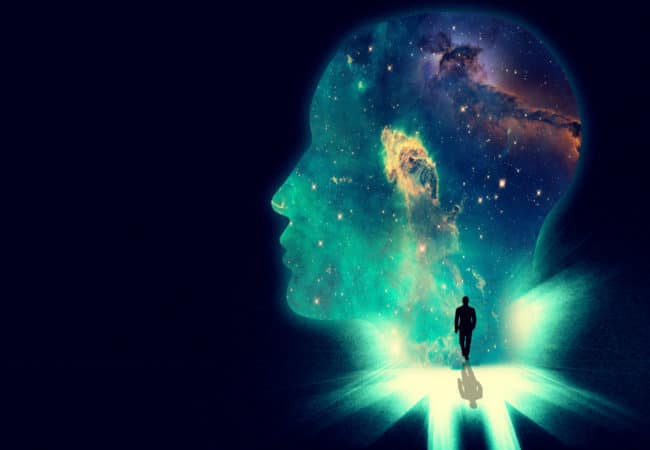
Spiritual Awakening: 7 Major Signs and 7 Phases
In this spiritual awakening guide, we’ll be looking into the 7 most important signs of a spiritual awakening, and its 7 phases.
Have you ever asked yourself the real meaning of your life? Do you live your life with purpose and direction? Or do you feel like you’re just a piece of driftwood that perpetually floats in the middle of the Pacific Ocean?
As individuals, it is a common theme in philosophy and even in the sciences that we’re equipped with both reason and freedom.
We are ultimately compelled to become human, often translating to asking the above mentioned questions.
After all, what meaning is there when we’re living a life that’s no different from those of the pigs?
Asking these questions is definitely the first step towards spiritual awakening.
By allowing yourself to be immersed in such an infinitely paradoxical problem, you are calling upon your higher self. And with proper spiritual guidance, you’ll be able to encounter a spiritual awakening.
Come and join us as we unravel the whole spiritual awakening process!
What is a Spiritual Awakening?
While a lot of complex definitions can be given for this, spiritual awakening can simply be understood as the process of waking up one’s higher self. What does this mean?
Waking up, or ‘to wake up’ means a shift: from sleeping state to waking state. But more importantly, this also means that we are transitioning from something that’s already there within us.
Yet even though it is true that our spiritual sense of self is always going to be within us, it doesn’t necessarily follow that we’re able to access it. If we look at the vast majority, we’ll see that most of them are spiritually asleep.
Disconnected from their higher selves, they remain contented with their worldly possessions. Absorbed by the comforts of modern technology, they choose to become incognizant of life’s deeper meaning.
Thus, those who are asleep need to be awake. As you are reading this, you might be one of those persons who need to wake up. And while it is easy to wish or even desire for such, how do you actually do it?
Phase 1: Mapping out the Starting Points – Identifying common Signs and Symptoms of Spiritual Awakening

Before embarking on a journey towards spirituality, it is crucial for us to review our starting points. Since we are not arbitrary creatures whose existence stands apart from humanity, we all have some sort of existential context from which we’re coming from.
And more often than not, this quest for spiritual awakening begins with a distortion of this existential context. With enough reason to chase after the unknown, we begin drifting away from what the ‘herd’ thinks should be.
7 common signs and symptoms of a spiritual awakening:
- Tragic/Bad Events in one’s life – perhaps the most common, having those tough challenges such as broken relationships or death of a loved one can cause one to search for their higher self.
- Lack of Meaning in one’s life – due to the repetitive and alienating world that we have today, individuals (especially from the western context), an experience that emptiness from within.
- Experience of the Divine – by being unintentionally subject to higher energies, we sometimes get that eerie feeling of encountering otherworldly sensations or even beings, often prompting us that there is more to our lives.
- Karmic Connections – tied by past lives, the emergence of Karmic connections with another person can become a significant cause for us to learn more about our own spirituality.
- Twin-flames/Soulmates – ultimately brought together by destiny, this magical experience can prompt us to search for more and understand the underlying webs that connect us with others.
- Dreams – whether it is astral projection or nightmares, these out of the normal dreams signifies the existence of the beyond. In fact, even in Hindu texts, dreams are seen as the gateway towards Brahman.
- Premonitions/Clairvoyance – unexplainable yet real, instances where we get to peek at the future can lead us to question the limits of reality and the idea of time. This can lead us to something more, something that transcends our current state of mind.
The above-listed points are just some of the general signs and symptoms of spiritual awakening.
Since this experience unfolds uniquely on each individual, the list only portrays some general ideas of how one can sense that there is an apparent spiritual awakening going on.
It doesn’t really matter which starting point you’ve used in order to begin your journey. More importantly, the act of stepping forward, the movement from one point to another is that which matters the most.
Since that movement signifies your transition, being able to recognize these events is crucial in your progress.
Phase 2: Embarking on a Journey – Triggering the search for the ‘more’

Previously, we’ve noted some common signs and symptoms where we feel the act of spiritual awakening in us.
And since these signs and symptoms gives us a good signal, it often allows us to identify our current state of mind and how it seeks to transition forward.
Given this predicament, the key question that we should be asking is – “how do we know when spiritual awakening is actually happening?”
True enough, the above mentioned experience doesn’t automatically amount to spiritual awakening.
For instance, a nightmare can be caused by a negative energy in you in as much as the death of a loved one leads to depression. Even meeting someone with a Karmic spiritual connection or a twin flame can lead to false hopes, shattering your untainted views on love and relationships.
As such, identifying the common ground between these experiences is the real key in understanding how and when it happens.
Simply put, the answer lies within triggering the search for ‘more.’
This means that if the above events happen to you or to someone you know, it doesn’t automatically translate to spiritual awakening.
That’s why it is simply a sign or a symptom because while these events can be very moving and compelling for us, the essence of spiritual awakening lies elsewhere.
When we experience these events, the key idea is to pay attention to how it changes us, and our nature. Challenging the foundations of our existence, these experiences triggers us to search for more.
Upon realizing the futility of our own life, we begin dismantling our preconceived notions of what life is or should be.
Instead, we start turning to unprecedented solutions where we can find our soul’s purpose – the search for more.
Phase 3: Immersion – a slow integration with the Divine

While the search for more is definitely a good starting point, this common search doesn’t automatically mean that we are in it for the long haul.
For instance, this search doesn’t warrant that we’ll automatically become individuals who can manifest our higher selves.
As a matter of fact, a lot of us are trying to begin this quest towards spiritual awakening and end up not quitting along the way. Why so?
When we begin immersing ourselves with these unfamiliar energies, we experience certain changes in our lives.
Precisely, these changes usually revolve around how we see our own life and the meaning that emanates from it.
For instance, the pursuit of spiritual awakening forces us to give up the worldly leisure that we’re used to.
Generally, the reason behind such is the fact that these activities often consume us, to a point of deciding our own path and direction in life.
Instead of becoming captains of our own ship, worldly trends silently mold us as individuals.
Thus, when doing the immersion phase of a spiritual awakening, it is important to recognize our small steps.
Even if it is just a simple addition of a 5-minute chakra meditation routine in your daily life, such small step of changing your perspective and matching it with your actions.
By recognizing these small battles, you’ll begin realizing and even matching the pace of your own spiritual awakening – a gradual integration with the divine.
Phase 4: Changing of Skin – Shedding of the ‘Untrue’

In phase 3, we’ve pointed out the necessary transition of perspective. By attempting to integrate oneself with the Divine, one must let go of most worldly perspectives to make way for a better one.
And by pursuing spiritual practices, this signals a transition towards positivity and growth.
But aside from such, this integration process also requires the changing of skin. Like a snake that changes skin, the growth of our spiritual self requires us to let go of the negative parts as well.
In shedding the ‘untrue’, we become open towards spiritual growth.
To begin with, the concept that we’re seeking, the Divine, is often equated to truth itself. As the incontestable reality that blankets all of existence, truth is something that we cannot deny or run away from.
However, in this world, we only know facets of truth.
While we may try our best through science and technology, such empirical and logical ways of life still won’t be able to explain the spiritual and mystical.
As such, pursuing this ultimate truth requires an act of introspection, one that investigates the nature of oneself.
And as we go deeper into that, we’ll most likely find the negative parts of our life, often signalling the need to take them out in order to move forward.
Phase 5: Emptying the Cup – A state of Spiritual Tabula Rasa

As one of the most significant theories on one’s personality, the concept of the Tabula Rasa literally translates to a ‘blank slate.’
Simply put, the theory holds that as we are born in this world, we are like a blank slate, where anything and everything can be written.
Given this blankness, the infinite possibility of our existence is practically unlocked. Since we can craft our lives the way we want it to, deciding for ourselves becomes our penultimate task, only second to the fact that we are alive and breathing.
With that, Spiritual awakening necessitates that we empty our cup. Only by ‘emptying our cup’ is it possible to fully live-out the concept of Tabula Rasa. Why so?
When our spiritual self is filled with misconceptions, our perspective of the world becomes misaligned. Because of this, it can be quite challenging for us to redirect ourselves towards the path of spiritual awakening.
Constantly distracted and misled by the existing notions of what is and how things should be done, the quest for spiritual awakening becomes a long and winding road.
Given such, the proper way to go is to empty one’s cup. By removing all these preconceived notions of how one should approach spirituality, we are allowing for a more natural and authentic spiritual awakening experience.
Instead of having to pass through some objective moral filter, we become more attuned to the universe as we listen more to our inner self.
Phase 6: Confronting your Shadow – The search for Resolution

Spiritual awakening is surprisingly a path that leads us deeper into ourselves. Whereas it is often portrayed as being able to link oneself to external energies, the ultimate path asks us to go deeper into who we are.
And while there are many ways to begin this path, this commonality of self-introspection and existential dread is almost always present in various notions and cultures.
Just like how the other sections outlined important areas in spiritual awakening, all of them ultimately leads to the path of self-discovery.
With that, what are two things that we find within ourselves?
Generally, going deeper into one’s subconscious through spiritual awakening exposes the underlying elements that are at work within us.
Just like the ideas of Carl Jung, unconscious thoughts can subconsciously influence our conscious decisions.
For instance, picking an ice cream flavor might be indirectly influenced or even conditioned by positive aptitude that we have with a particular color or taste that we associate ourselves with.
Similarly, our unconscious notions of right or wrong, good or bad, are inevitably exposed as we take the path of spiritual awakening.
Dreams, for example, reflect our unconscious thoughts through consistent symbolisms. And as we learn more about these symbolisms, we realize how important or influential they are in our conscious state.
A spiritual awakening will eventually take us to confront our shadows. Just like how the movies portray the task of confronting one’s inner demons, our shadows are repressed parts of our self that continues to influence us in the subtlest of ways.
And as we confront them, a lot of us will back out, especially when the shadow archetype has already established a reinforced bulwark within our psyche.
For instance, this happens when someone perceives their notion of self-image negatively.
As one seeks to be consistent with a negative self-image like “I will never be able to live a healthy lifestyle since it will change who I am”, a silent shadow is reinforcing this with the notion that pursuing healthy changes won’t lead to happiness.
For as long as we are unable to break these walls, they will remain, and bar us from unlocking our true potential.
In order to resolve this, one must undergo the process of Shadow Work. In doing so, you’ll find ways to resolve your inner issues and deal with your shadow, ultimately allowing your spiritual journey to move forward.
Phase 7: Individuation – A Quest for Wholeness

Assuming that you’ve already surpassed your own inner struggles, the quest for spiritual awakening will finally reach its peak.
And as you go deeper into your spiritual awakening journey, you’ll eventually find yourself closer towards the path of integration.
But integration with what?
Surely, a lot of alternative religions will have an answer for this. Whether it is their own god or some sort of universal energy, all of these truths form part of the general truth that we seek to be integrated with.
And while we struggle to even grasp this concept, some thinkers have presented a plausible, even scientific answer for this.
As such, one of the most famous perspectives hails from none other than Carl Jung himself.
Individuation, according to Jung, is the process of integrating yourself and finding your own significance amidst the collective unconscious.
The notion of truth has long been a subject of the greatest minds in human history.
Philosophers, for instance, have grappled with this question since time immemorial and still are unable to provide a rational and objective conclusion to this truth.
Well, perhaps, this is because such is beyond our nature in the first place.
However, simply dismissing it as ‘beyond our nature’ is like saying that a god exists without attempting to prove such.
Like an empty and blind faith, one that is not backed by reason or even an attempt to reason becomes opinion and a mere belief.
This is where Jung comes into the picture. By attempting to merge the ideas of spirituality together with rational psychological concepts, Jung ultimately came up with the notion of the jungian archetypes.
As shared universal responses that are pre-existent in our psyche, Jung believes that this boundless knowledge is indeed present in each one of us.
Even so, most of us are unable to access or even realize its existence despite the fact that such archetypes are almost always in play.
With that, what role does spiritual awakening have, and how does it lead us to the path of individuation?
Simply put, spiritual awakening is a process that forces us to constantly break our inner boundaries.
By digging deeper, we learn more about ourselves and in this constant push-and-pull process, we also learn more about the truths in our lives.
And as we move further, this truth will eventually unfold to us as something that both brings us closer and farther to ourselves.
An example of someone who has achieved spiritual transcendence would be none other than Buddha himself. Recognizing how universal concepts shape who we are, he pointed out how we can find true happiness in this world.
Similarly, such notions become more apparent as we read further into the whole individuation process.
By learning more about who we are, individuation brings forth the unlimited potential within us. Unlocking our true potential, we are eventually led to the path of spiritual enlightenment.
Final Word
In learning to understand our true nature as individuals, we must take on the challenge of pursuing our higher selves.
By elevating ourselves above our animalistic tendencies, we are unlocking something more than our rational mind and free soul.
Given this quest towards spiritual awakening, we’ve seen in this article the arduous path that we must take.
Transcending all our preconceived notions, the whole individuation process takes us towards this process of integrating ourselves with the collective unconscious.
It is crucial for you to find your own resolve. By identifying your own reason for pushing forward, you’ll be able to face these challenges and outdo them.
As long as you remain steadfast and determined, the inexplicable will unfold itself to you. And while such may be transcendental by nature, your core reason will empower you to explore unchartered waters of spirituality, taking you to the beautiful journey of individuation!

The Individualogist Team is made up of archetype fanatics, individuation practitioners, and spirituality fans. Our humble group has banded together to deliver thought-provoking, life-changing, and growth-probing wisdom.
24 thoughts on “Spiritual Awakening: 7 Major Signs and 7 Phases”
Comments are closed.
Pingback: Chakra Balancing: A Complete Guide Towards Healing and Awakening
Pingback: Dreams Spiritual Symbols: Top 20 Symbols in Dreams and their Meanings
Pingback: Vortex Energy Awakening: 3 Types of Vortexes for Awakening
Pingback: Forms of New Age Divination: An Introduction | Individualogist.com
Pingback: The Complete Chakra Energy Guide | Individualogist
Pingback: Animals In Dreams: Animals and their Dream Interpretations
Pingback: Higher Self: How to Meet Your Higher Self? - Individualogist
Pingback: Finding True Happiness: 5-Step Spiritual Approach - Individualogist
Pingback: How to Heal Your Soul Using Crystals | Does Crystals can read force?
Pingback: Ego Death: 7 Hidden Stages To Obliterate The Self - Individualogist
Pingback: How To Strengthen Your Sense of Self - Individualogist
Pingback: What is a Spiritual Vortex? (A Complete Guide) - Individualogist.com
Pingback: 5 Signs You Have a Spiritual Ego - Individualogist.com
Pingback: Spiritual Awakening: 7 Major Signs and 7 Phases – Spiritism.io
Pingback: New Moon Rituals: 9 Tips For Love and Abundance - Individualogist.com
Pingback: Are You Clairsentient? 11 Traits of Clairsentience - Individualogist.com
Pingback: Divine Timing Explained: How To Trust It - Individualogist.com
Pingback: What Are Soul Contracts? (& What If You Break One) - Individualogist
Pingback: 9 Powerful Mantras For Healing And Manifesting - Individualogist.com
Pingback: How To Find Your Soul Purpose - Individualogist.com
Pingback: 8 Types Of Earth Angels (Plus Their Purpose) - Individualogist.com
Pingback: What Are Crystal Children (Are You One?) - Individualogist.com
Pingback: What Is Spiritual Ascension & How To Achieve It? - Individualogist
Pingback: 8 Twin Flame Stages: Signs You've Met Soulmate - Individualogist.com